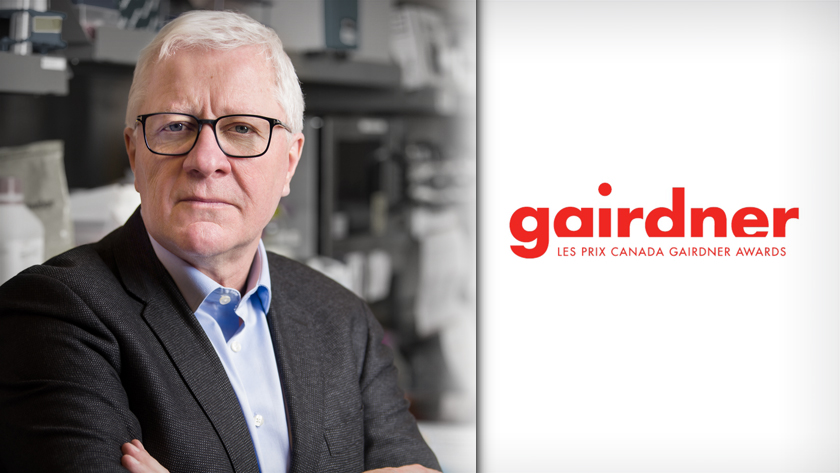
On April 5, 2022, Dr. John Dick, Senior Scientist at the Princess Margaret Cancer Centre, received the prestigious Canada Gairdner International Award.
“It was a bit of a surprise, shock, really! It's a mix of humility, gratification and pride,” said Dr. Dick when he got the news from the Gairdner Foundation. “I'm proud of the fact that our work is being recognized; we've done something important and we’re carrying the mantle of Canada, representing our country.”
The Canada Gairdner International Award is one of the world’s highest honours in medical science. Each year, the Gairdner Foundation announces five awardees. The other awardees for 2022 are Dr. Stuart Orkin, Distinguished Professor of Pediatrics at Harvard Medical School; Dr. Katalin Karikó, Distinguished Professor of Pediatrics at Harvard Medical School; Dr. Drew Weissman, Professor at the University of Pennsylvania; and Dr. Pieter Cullis, Professor at the University of British Columbia.
Two additional awards were announced: the John Dirks Canada Gairdner Global Health Award, which went to Dr. Zulfiqar Bhutta, Co-Director at the SickKids Centre for Global Child Health; and the Canada Gairdner Wightman Award, which was awarded to Dr. Deborah Cook, Academic Chair of Critical Care and professor at McMaster University.
Dr. Dick’s Canada Gairdner International Award honours his seminal discovery of leukemic stem cells, as well as his detailed characterization of these cells—work that is changing the diagnosis and treatment of acute myeloid leukemia.
His team’s work was a major shift in our understanding of cancer biology, demonstrating that individual cancer cells are not equal: only some are able to self-renew and act as stem cells. His work revealed that leukemic stem cells can evade therapy to cause cancer relapse and that leukemic stem cells are present prior to diagnosis.
These findings shed light on why chemotherapy fails some patients as well as opening the door to new diagnostic, preventative and therapeutic strategies. For example, to help customize therapies to treat leukemia in individual patients, his team developed a ‘stemness score’. This score combines information from 17 genes that can be used clinically to determine a patient’s risk of having a poor outcome.
Click on the video above to hear Dr. Dick discuss his career, contributions, thoughts on mentorship and what it takes to advance science and cancer care.
“Dr. John Dick’s seminal discoveries have revolutionized our understanding of cancer, providing definitive proof of a new model of tumour initiation that is today a major field of study in virtually all major cancer types,” says Dr. Brad Wouters, Executive Vice President, Science and Research, UHN.
Now, the efforts of cancer researchers around the world, including those of Dr. Dick and other research teams at the Princess Margaret Cancer Centre, are focused on unravelling the unique properties of individual cells in cancer. This work has revealed new strategies that cancer stem cells can use to survive cancer therapy, including becoming dormant, using stress signals and changing their metabolism.
“Dr. Dick's scientific contributions on the development of normal and cancerous blood cells continue to have a major impact on cancer research and treatment. This prestigious award reflects his status among the world’s elite in human cancer biology,” adds Dr. Wouters.
Listen to the Beyond the Breakthrough podcast
Listen to Dr. Dick discuss his pioneering LSC discovery, as well as his career path from a one-room schoolhouse in rural Manitoba to a leading medical researcher on the UHN’s Behind the Breakthrough podcast.
About the Gairdner award
Each of the five Canada Gairdner International Awards handed out each year comes with a $100,000 prize. Over 400 scientists have received an award since they were established in 1959 by the Gairdner Foundation and 96 of those awardees have gone on to receive a Nobel Prize. Read more about the awards and the other winners on the Gairdner Foundation website.
Dr. Dick’s background, achievements and seminal articles
Dr. John Dick completed his undergraduate and graduate studies at the University of Manitoba, where he received his PhD in 1984. He undertook post-doctoral training at the then-named Ontario Cancer Institute in Toronto, which is now the Princess Margaret Cancer Centre (PM). He worked at the Research Institute of the Hospital for Sick Children from 1986 to 2001 before returning to PM, where he is currently a Senior Scientist and holds Tier 1 Canada Research Chair in Stem Cell Biology.
He has been internationally recognized through his election as a Foreign Member of the US National Academy of Medicine (2020) and to the Fellowship of the Royal Society of Canada (2004); the Royal Society of London, UK (2014); and the AACR Academy (2016). He has received numerous prestigious awards including the Dameshek Prize (2005), Thomas Prize (2009) and Mentor Award (2018) from the American Society of Hematology; the Clowes Memorial Award (2008) and AACR-Pezcoller Prize (2020) from American Association for Cancer Research; the Noble Prize (2000) and the Diamond Jubilee Award (2007) (with Drs. J.E. Till and E.A. McCulloch) from the National Cancer Institute of Canada; the Gold Leaf Prize for Discovery (2017) from the Canadian Institutes of Health Research; the Tobias Award (2017) and ISSCR Award for Innovation (2019) from The International Society for Stem Cell Research; and The KEIO Medical Science Prize (2017).
Some of the key articles outlining Dr. Dick’s discoveries and contributions include:
- Kamel-Reid S, Dick JE. Engraftment of immune-deficient mice with human hematopoietic stem cells. Science. 1988 242(4886):1706-9.PMID: 2904703.
- Lapidot T, Sirard C, Vormoor J, Murdoch B, Hoang T, Caceres-Cortes J, Minden M, Paterson B, Caligiuri MA, Dick JE. A cell initiating human acute myeloid leukaemia after transplantation into SCID mice. Nature. 1994 367(6464):645-8, PMID: 7509044.
- Bonnet D, Dick JE. Human acute myeloid leukemia is organized as a hierarchy that originates from a primitive hematopoietic cell. Nat Med. 1997 (7):730-7. PMID: 9212098.
- Dick JE. Stem cell concepts renew cancer research. Blood. 2008 112(13):4793-807. PMID: 19064739.
- Kreso A, Dick JE. Evolution of the cancer stem cell model. Cell Stem Cell. 2014 14(3):275-91. PMID: 24607403.





